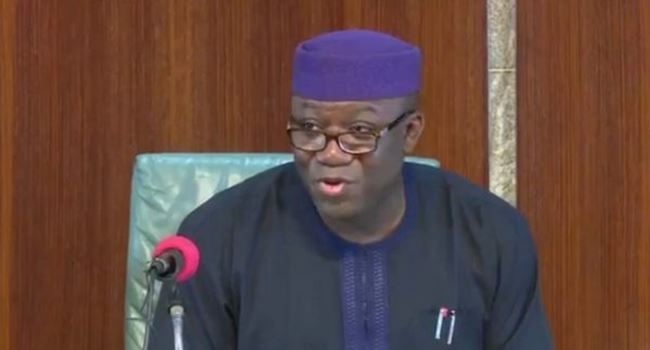News
Unlike Okorocha, Gov Fayemi wants Senate scrapped, tells why

Ekiti State governor, Kayode Fayemi has shared a similar view recently expressed by Senator Rochas Okorocha, that Nigeria needs a unicameral federal legislature.
But unlike Okorocha, who wanted the House of Representatives scrapped, Fayemi said the Nigerian Senate should be scrapped instead.
According to the Ekiti State governor, what Nigeria really needs is the House of Representatives and not the Senate.
He stated this when he spoke at one of the panel sessions on the sidelines of the 25th edition of the Nigerian Economic Summit with the theme, ‘Nigeria 2050: Shifting gears.’
He said, “We do need to look at the size of government in Nigeria and I am an advocate of a unicameral legislature. What we really need is the house of representatives because that is what represents.
“You have three senators from little Ekiti and you have three senators from Lagos state. It’s a no-brainer that it’s unequal, I guess the principle is not proportionality but that if you are a state, you get it automatically but I think that we can do away with that. There are several things that we can do away within the government.
“The Oronsaye report that proposed mergers of several MDAs that are doing the same thing is something that the government should pay serious attention to and reduce the resources being expended on them.”
The senate has 109 senators while the house of representatives has 360 members.
He also spoke on the security vote spent by governors saying, “Security vote exists in various forms and not just in Nigeria. They may not call it security vote, they may call it contingency vote.
Read also: Osun Assembly confirms Gov Oyetola’s commissioner-nominees
“The important thing is the government utilises a wide range of mechanism to guarantee security in a state and it is not just ammunition and weapons that I am talking about. Even keeping the touts in check is a security challenge in many states and managing that process may cost you money that you cannot necessarily show the auditors.
“The other element which states don’t get credit for is what we do for the federal police. Nigeria is the only federation in the world that I know runs a centralised police force. You have federal police that is not being funded properly by the federal government so the responsibility for funding those guys that are posted to your state is on the state. You buy uniforms, ammunition, pay allowances, do life insurance, buy vehicles; that is not provided for and that is security vote because we are expected to protect the citizens.
“Let me also say this, you will not hear it out there from anybody. When people are kidnapped and their relatives are harassing the governor or security institutions to track down the victims.
“We track them down, we know where they are. What you hear us say outside is that we don’t pay ransom and we stick by that. We don’t pay ransom, we don’t bribe kidnappers but we get those people released.
“I will not go into the ugly details but we spend money in ensuring that we get abductees and victims out of harm’s way because ultimately that is what the victim wants us to do. The parents don’t want to hear the story that we don’t pay a ransom. You just have to whatever you have to do to ensure that we get our citizens out of danger.”
Others on the panel alongside Fayemi were Babatunde Fowler, executive chairman of the Federal Inland Revenue Service (FIRS), Jordi Borrut Bel, Nigerian Breweries MD, and Eme Essien, country manager of the International Finance Corporation (IFC).
Join the conversation
Support Ripples Nigeria, hold up solutions journalism
Balanced, fearless journalism driven by data comes at huge financial costs.
As a media platform, we hold leadership accountable and will not trade the right to press freedom and free speech for a piece of cake.
If you like what we do, and are ready to uphold solutions journalism, kindly donate to the Ripples Nigeria cause.
Your support would help to ensure that citizens and institutions continue to have free access to credible and reliable information for societal development.
























